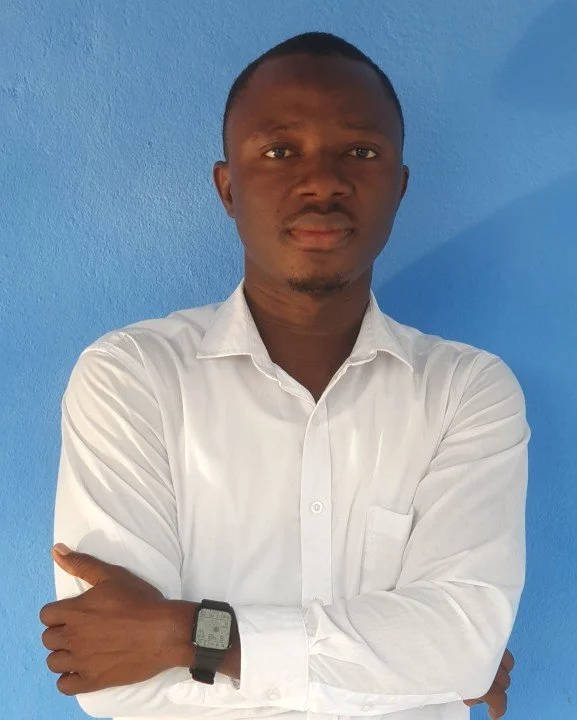Ibrahim Bangura
Pronouns: He/Him
Organisations: Future Leaders Initiative SL; Youth for Peace and Security Africa; Global Peace Chain; US Alliances to Ending the Hitting of Children
Country of origin: Sierra Leone
Profile
Ibrahim Bangura is a peacebuilder, educator and child activist who lives in Freetown, Sierra Leone. His journey began at the age of seven, when he initiated advocacy for gender inclusivity within his community. He later moved to the capital city of Freetown, where he undertook voluntary local peacebuilding work. Ibrahim worked as a local translator in his village, assisted the United Nations Mission in Sierra Leone (UNAMSIL) and collaborated with peacekeeping forces during Sierra Leone’s 11-year war.
In 2019, Ibrahim assumed the role of Acting Deputy Country Director at Youth for Peace and Security Africa. He focused on preventing community violence and mobilising youth as peace ambassadors. He particularly addressed politically motivated violence among young individuals. Later, he founded Future Leaders Initiative to report gender-based violence to Sierra Leone’s First Lady. The organisation evolved to focus on preventing all forms of abuse and violence within communities, especially against women and children. On August 20, 2019, the initiative was renamed Future Leaders Initiative SL, a nonprofit organization dedicated to ending violence against children in schools, homes, and communities through its flagship educational campaign, Pens Up Canes Down. Ibrahim is a recipient of the Prince Claus Fund Award (2018–2021), a Child Ambassador for the US Alliance to End the Hitting of Children, a Southern Voice Young Think Tanker Awardee, a poet, author of My Road, and a facilitator with Music Action International (MAI) through WayOut Arts UK.
‘Human rights education is the only way to everlasting peace’
Story
‘Our purpose is to see how we can create an environment free from all sorts of violence. And as young people, we should lead by example,’ Ibrahim Bangura said. He grew up with political instability in Sierra Leone, where he witnessed societal polarisation and unregulated violence. He said, ‘When one party is in power, the other finds it difficult to survive.’ Political leaders exploited young individuals to suppress opposition, exacerbating societal tensions, he said. ‘The minds of young people are especially open to an atmosphere of war, which allows politicians to say, “Go, fight for me!”’ Ibrahim’s tenure at Youth for Peace and Security Africa fuelled his dedication to violence prevention, recognising the pivotal role of youth in society.
Ibrahim lost both his parents when he was three years old. ‘I experienced trauma, neglect and abuse as a child, which motivated me to become a peacebuilder,’ he said. He has been actively combating violence since he was seven, particularly against women and children. Today, his organisation focuses on human rights education and reaching the youth by giving educational school workshops that address issues like corporal punishment and rape threats. He said he believes that ‘human rights education is the only way to everlasting peace.’
When Ibrahim founded the Future Leaders Initiative, he emphasised neutrality to reach all and avoid political affiliations, despite challenges in securing government support. ‘If you are a young person here in Sierra Leone, you are associated with politics,’ said Ibrahim, ‘so we don’t want to affiliate our organisation with any political body.’ However, this has come with challenges, as government organisations rarely pay attention to NGOs without connections. He said, ‘We have been struggling to find support when it comes to running my initiative, and if I have a project in the present government, they will take a look at my name, and since it is not related to a particular tribal name, they’ll scrutinise my name.’
Ibrahim sees peace as more than the absence of war – ‘To me, peace means giving the opportunity for someone to talk, to express themselves, while having access to basic necessities. It means the presence of everything that can develop a human being, everything that is needed to make someone happy, including respect, love and freedom of expression.’ Ibrahim’s work continues to empower both youth and parents with knowledge on children’s rights, education, and dignity, paving the way for a more just and peaceful Sierra Leone.
Published in 2025

